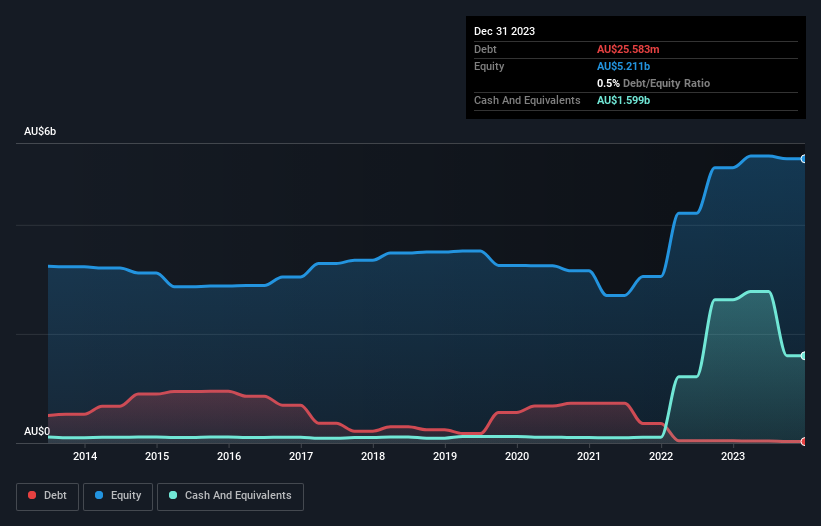Howard Marks put it nicely when he said that, rather than worrying about share price volatility, 'The possibility of permanent loss is the risk I worry about... and every practical investor I know worries about.' So it might be obvious that you need to consider debt, when you think about how risky any given stock is, because too much debt can sink a company. As with many other companies Whitehaven Coal Limited (ASX:WHC) makes use of debt. But the real question is whether this debt is making the company risky.
Why Does Debt Bring Risk?
Debt assists a business until the business has trouble paying it off, either with new capital or with free cash flow. If things get really bad, the lenders can take control of the business. However, a more usual (but still expensive) situation is where a company must dilute shareholders at a cheap share price simply to get debt under control. Having said that, the most common situation is where a company manages its debt reasonably well - and to its own advantage. When we examine debt levels, we first consider both cash and debt levels, together.
See our latest analysis for Whitehaven Coal
What Is Whitehaven Coal's Debt?
You can click the graphic below for the historical numbers, but it shows that Whitehaven Coal had AU$25.6m of debt in December 2023, down from AU$39.1m, one year before. But it also has AU$1.60b in cash to offset that, meaning it has AU$1.57b net cash.

How Healthy Is Whitehaven Coal's Balance Sheet?
We can see from the most recent balance sheet that Whitehaven Coal had liabilities of AU$532.9m falling due within a year, and liabilities of AU$876.9m due beyond that. On the other hand, it had cash of AU$1.60b and AU$361.5m worth of receivables due within a year. So it can boast AU$550.9m more liquid assets than total liabilities.
This short term liquidity is a sign that Whitehaven Coal could probably pay off its debt with ease, as its balance sheet is far from stretched. Simply put, the fact that Whitehaven Coal has more cash than debt is arguably a good indication that it can manage its debt safely.
It is just as well that Whitehaven Coal's load is not too heavy, because its EBIT was down 66% over the last year. When it comes to paying off debt, falling earnings are no more useful than sugary sodas are for your health. When analysing debt levels, the balance sheet is the obvious place to start. But ultimately the future profitability of the business will decide if Whitehaven Coal can strengthen its balance sheet over time. So if you want to see what the professionals think, you might find this free report on analyst profit forecasts to be interesting.
But our final consideration is also important, because a company cannot pay debt with paper profits; it needs cold hard cash. Whitehaven Coal may have net cash on the balance sheet, but it is still interesting to look at how well the business converts its earnings before interest and tax (EBIT) to free cash flow, because that will influence both its need for, and its capacity to manage debt. During the last three years, Whitehaven Coal produced sturdy free cash flow equating to 74% of its EBIT, about what we'd expect. This cold hard cash means it can reduce its debt when it wants to.
Summing Up
While we empathize with investors who find debt concerning, you should keep in mind that Whitehaven Coal has net cash of AU$1.57b, as well as more liquid assets than liabilities. The cherry on top was that in converted 74% of that EBIT to free cash flow, bringing in AU$356m. So we are not troubled with Whitehaven Coal's debt use. There's no doubt that we learn most about debt from the balance sheet. But ultimately, every company can contain risks that exist outside of the balance sheet. We've identified 3 warning signs with Whitehaven Coal (at least 1 which can't be ignored) , and understanding them should be part of your investment process.
At the end of the day, it's often better to focus on companies that are free from net debt. You can access our special list of such companies (all with a track record of profit growth). It's free.
Valuation is complex, but we're here to simplify it.
Discover if Whitehaven Coal might be undervalued or overvalued with our detailed analysis, featuring fair value estimates, potential risks, dividends, insider trades, and its financial condition.
Access Free AnalysisHave feedback on this article? Concerned about the content? Get in touch with us directly. Alternatively, email editorial-team (at) simplywallst.com.
This article by Simply Wall St is general in nature. We provide commentary based on historical data and analyst forecasts only using an unbiased methodology and our articles are not intended to be financial advice. It does not constitute a recommendation to buy or sell any stock, and does not take account of your objectives, or your financial situation. We aim to bring you long-term focused analysis driven by fundamental data. Note that our analysis may not factor in the latest price-sensitive company announcements or qualitative material. Simply Wall St has no position in any stocks mentioned.
About ASX:WHC
Whitehaven Coal
Develops and operates coal mines in Queensland and New South Wales.
Good value with proven track record.
Similar Companies
Market Insights
Community Narratives



